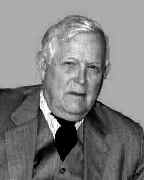Person: Kalman, Rudolf Emil

Rudolf Kalman was a Hungarian-born American mathematician best known for his work in control theory.
Mathematical Profile (Excerpt):
- Before the award of his doctorate Kalman had begun to publish influential papers.
- After the award of his doctorate Kalman was appointed as a Research Mathematician at the Research Institute for Advanced Studies in Baltimore, Maryland.
- Not only have they led to eminently useful developments, such as the Kalman-Bucy filter, but they have contributed to the rapid progress of systems theory, which today draws upon mathematics ranging from differential equations to algebraic geometry.
- Kalman was not present at the 93rd American Mathematical Society Annual meeting in San Antonio, Texas, to receive the Prize but his response, attempting to explain the significance of the papers, was read at the meeting.
- Let us return to giving details of Kalman's career.
- Kalman retired from his positions at the University of Florida in 1992 (when he became Professor Emeritus) and from the Eidgenössische Technische Hochschule in Zürich in 1997.
- We have looked at some of the important papers Kalman wrote in the early part of his career.
- While some of these concepts were also encountered in other contexts, such as optimal control theory, it was Kalman who recognized the central role that they play in systems analysis.
- The paradigms formulated by Kalman and the basic results he established have become an intrinsic part of the foundations of control and systems theory and are standard tools in research as well as in every exposition of the area, from undergraduate engineering textbooks to graduate-level mathematics research monographs.
- During the 1970s Kalman played a major role in the introduction of algebraic and geometric techniques in the study of linear and nonlinear control systems.
- In addition to many research papers, Kalman has jointly authored the book Topics in mathematical system theory (1969) with Peter L Falb and Michael A Arbib.
- We mentioned above that Kalman received the Steele Prize in 1986.
- Kalman theory, which was established in the early 1960s, brought a fundamental reformation to control engineering and since then laid the foundation for the rapid progress of modern control theory.
- for the development and dissemination of the optimal digital technique (known as the Kalman Filter) that is pervasively used to control a vast array of consumer, health, commercial, and defense products.
- On 7 October 2009 U.S. President Barack Obama honoured Kalman in an awards ceremony at the White House when he presented him with the National Medal of Science, the highest honour the United States can give for scientific achievement.
- Before the advent of the Kalman filter, most mathematical work was based on Norbert Wiener's ideas, but the 'Wiener filtering' had proved difficult to apply.
- Kalman's approach, based on the use of state space techniques and a recursive least-squares algorithm, opened up many new theoretical and practical possibilities.
- The impact of Kalman filtering on all areas of applied mathematics, engineering, and sciences has been tremendous.
- Kalman's ideas on statistics are thought-provoking and he has written a number of interesting articles on this topic since retiring.
Born 19 May 1930, Budapest, Hungary. Died 2 July 2016, Gainesville, Florida, USA.
View full biography at MacTutor
Tags relevant for this person:
Origin Hungary
Thank you to the contributors under CC BY-SA 4.0! 

- Github:
-

- non-Github:
- @J-J-O'Connor
- @E-F-Robertson
References
Adapted from other CC BY-SA 4.0 Sources:
- O’Connor, John J; Robertson, Edmund F: MacTutor History of Mathematics Archive
